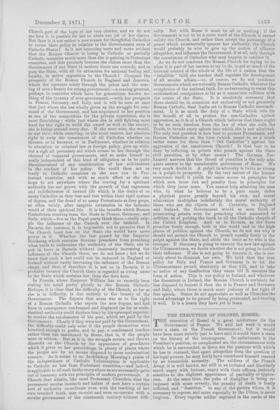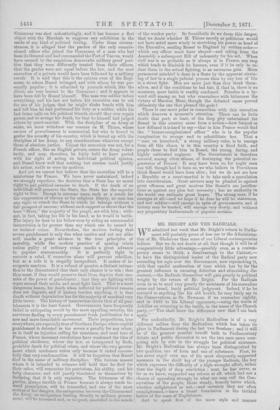THE EXECUTION OF COLONEL ROSSEL. T HE execution of Rossel is
a great misfortune for the Government of France. We said last week it would leave a stain on the French Government, but it would have been more strictly just to have said it would leave a stain on the history of the interregnuro. So unfortunate is the President's position, so complicated are the circumstances with which he is surrounded, so fierce are the passions with which he has to contend, that apart altogether from the question of his legal powers, he may fairly have considered himself coerced by an irresistible necessity. The soldiers of the French Army, it is well known, are still in an irritated and disorderly mood, angry with fortune, angry with their officers, jealously sensitive to the slightest appearance of partiality or oppres- sion. At the same time, the yoke of discipline is being re- imposed with some severity, the penalty of death is freely inflicted, and "desertion " to any of the parties whom it is necessary to repress, and more especially to the Ultras, is never forgiven. Every regular soldier captured in the ranks of the
Commune was shot unhesitatingly, and it has become a first .object with the Marshals to suppress any exhibition in the ranks of any kind of political feeling. Under these circum- stances, it is alleged that the pardon of the only commis- sioned officer who joined the Commune, of a man who had been its General and had commanded the Fort of Vanves, would have seemed to the suspicious democratic soldiery proof posi- tive that they were differently treated from their officers, that the grades were not equal before the law, and the next execution of a private would have been followed by a military revolt. It is said that this is the opinion even of the Engi- neers, to whom Rossol belonged, and with whom he was per- sonally popular ; it is admitted by journals which, like the are very lenient to the Commune ; and it appears to have been felt by Ressel himself. The man was soldier before everything, and his last act before his execution was to ask for one of his judges, that he might shake hands with him and tell him he had performed his duty as a soldier, while his last letter calls on his political friends, should they ever regain power, not to avenge his death, for that he himself had judged others by court-martial. With the discipline of an Army at stake, we must withdraw our censure on M. Thiers, whose excuse of powerlessness is nonsensical, but who is bound to prefer the security of his country, which is bound up with the discipline of her Army, to any considerations whatever except those of absolute justice. Unjust the execution was not, for a French officer, like an English private, enters the Army volun- tarily, and may, therefore, be fairly held to have parted with his right of acting on individual political opinion, and Rossel knew well that nothing but success could justify his action, noble as were its motives.
And yet we cannot but believe that the execution will be a misfortune for France. We have never maintained, indeed we strongly repudiate, the doctrine that a State has no moral right to put political enemies to death. If the death of an individual will preserve the State, the State has the superior right to live. Except in extreme cases, such as a revolt for the suppression of slavery or for religious liberty, no man has any right to attack the State to which he belongs without a fair prospect of success; without such support as shows that the true "State," the majority of the people, are with him ; with- out, in fact, taking his life in his hand, as he would in battle. The injury he does to his fellow-men by aiding an unsuccessful insurrection is far greater than any which can be caused by an isolated crime. Nevertheless, the modern feeling that severe punishment is only due when motive and. act are alike evil, marks a great • -advance in the true principles of morality, while the modern practice of sparing rebels unless guilty of ordinary crime marks a great advance in popular statesmanship. It is perfectly right to execute a rebel, if execution alone will prevent rebellion, but as a rule it is stupidly inexpedient. It makes of in- surgents martyrs. It is a refusal of quarter, a distinct intima- tion to the discontented that their only chance is to win ; that they must, if they would preserve their lives, deprive their ene- mies of the power of punishment ; that they are fighting with ropes around their necks, and must fight hard. That is a most dangerous lesson, for death when inflicted for political reasons Zoos not degrade, and if history teaches anything, it is that death without degradation has for the majority of mankind very little terror. The history of insurrection shows that of all pun- ishments it is the least feared. Governments have frequently failed in extirpating revolt by the most appalling severity, the survivors finding in every punishment fresh justification for a MVP and more formidable movement. These propositions, true everywhere, are especially true of Southern Europe, where capital punishment is detested as too severe a penalty for any crime, as in itself an injustice calling for resistance, and most true of France, where incessant revolutions have weakened the idea of political obedience, where the law, as interpreted by Reds, prohibits death for political crime, and where the very govern- ment which condemns exists only because it risked success- fully that very condemnation. It will be forgotten that Rossel died in the name of military discipline. The furious masses whom it is intended to overawe will hold that he died for their sakes, will remember his patriotism, his ability, and his lofty character, and will justify bloodshed to themselves by declaring that it is only expiation. The bitterness of the parties, always terrible in France because it always tends to- wel(' proscription, will be intensified, and one of the most serious of her dangers, the antagonism between the Citizens and the Army, an antagonism leading directly to military govern- ment, will be increased and, so to speak, sanctified in the minds of the weaker party. So formidable do we deem this danger, that we doubt whether M. Thiers merely as politician would not have acted more wisely in stretching his power as head of the Executive, sending Bosse] to England by written order— which any officer must have obeyed—and taking from the Assembly a subsequent Bill of indemnity for his act. When civil war is so probable as it always is in France, any step which tends to diminish its horrors, even if it be only to re- duce them to the actual fighting, is an enormous gain. More permanent mischief is done in a State by the apparent strain- ing of law in a single judicial process than by any loss of life in a street fight. Men are more just than they think them- selves, and if the conditions be but fair, if, that is, there is no massacre, mere battle is readily condoned. Peterloo is a by- word still among us, but who remembers with bitterness the victory of Marston Moor, though the defeated cause proved. ultimately the one that pleased. the gods ?
There is one more point in connection with this execution which deserves a moment's attention. There can be little doubt that part, at least, of the deep pity entertained for Rossel in this country arose from a notion—how formed or how diffused it is hard to say—that in him France would find the " bronze-complexioned officer " who is in the popular imagination to avenge and to eehabilitato her. That a " man on horseback," a strong military ruler, is to emerge from all this chaos, is in this country a fixed faith, and people chose to find him in Ressol, the young, daring, and highly cultivated engineer. The Government is therefore accused, among other crimes, of destroying the potential re- generator of France. It may have been so, for aught man can tell, though had it been so, we who believe in Providence think Rossel would have been alive ; but we do not see how a Republic or a court-martial is to take such a speculation into consideration. Great services may be pleaded as against great offences, and great motives like Rossel's are justifica- tions as against any plea but necessity ; but no authority in the world can estimate great hopes. The strong man, if he emerges at all—and we hope if he does he will be statesman, and not soldier—will emerge in spite of governments, and if history may be trusted, will emerge very slowly, and without any preparatory fanfaronnade of popular acclaim.



































 Previous page
Previous page